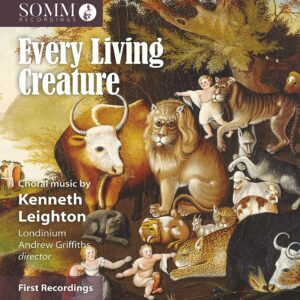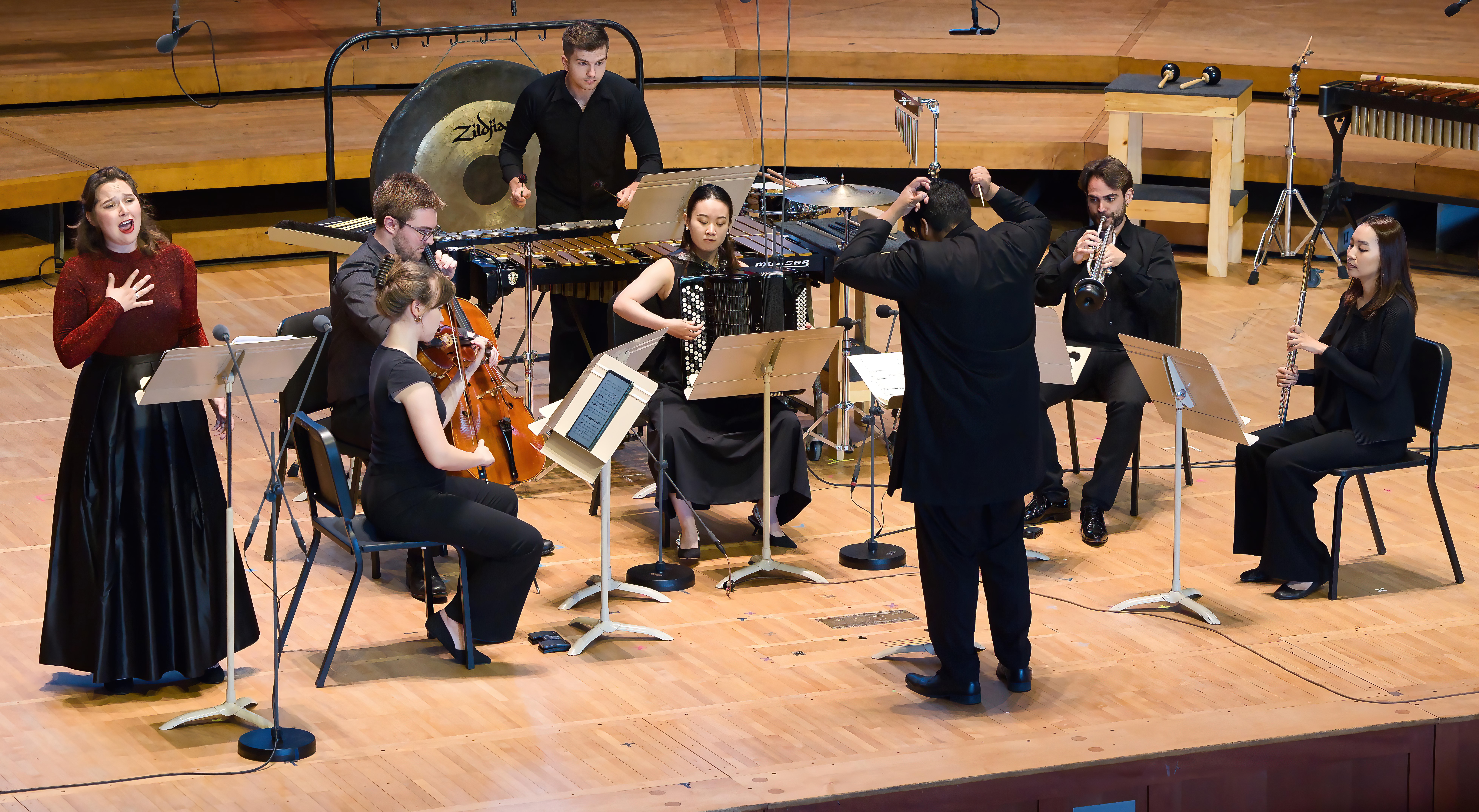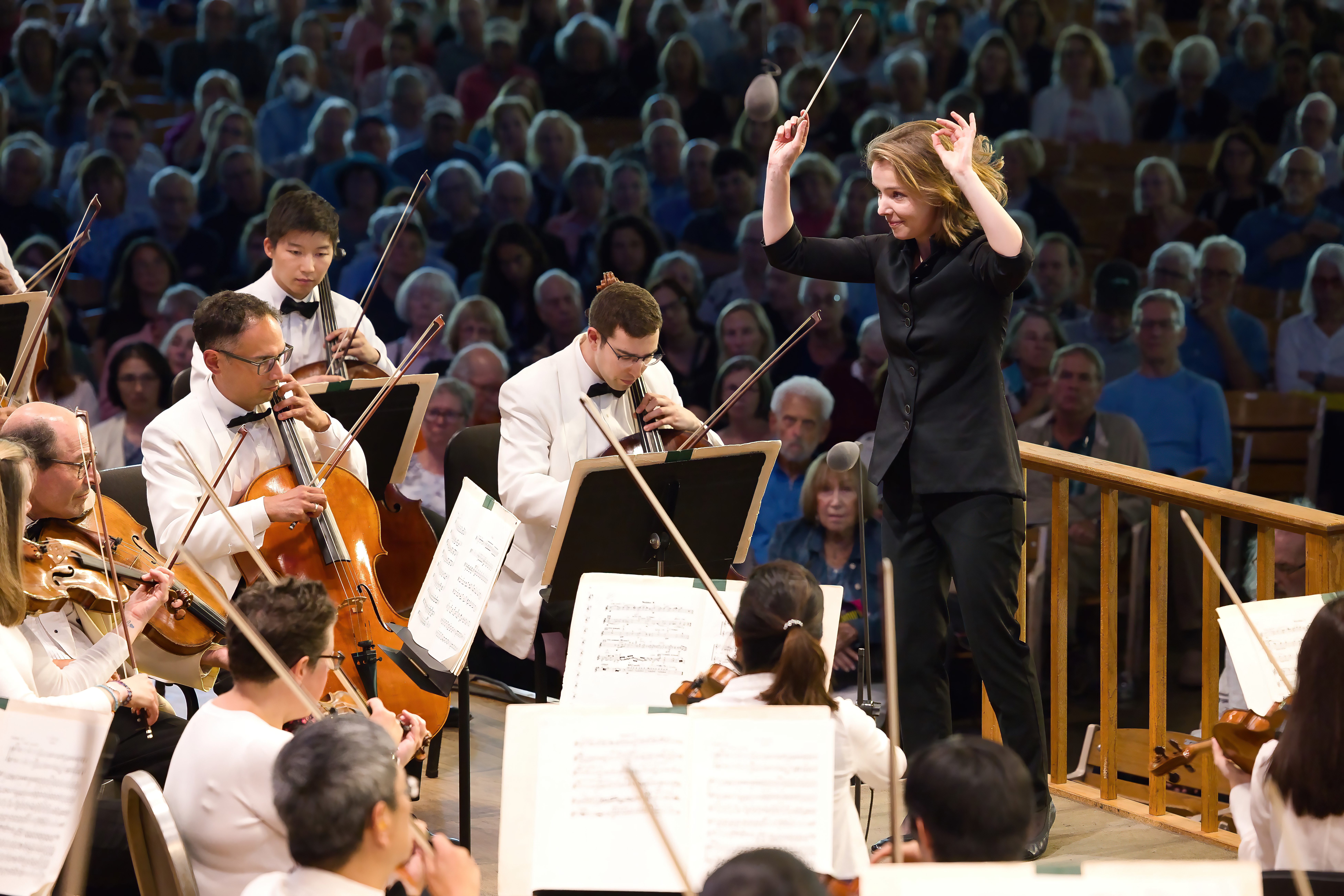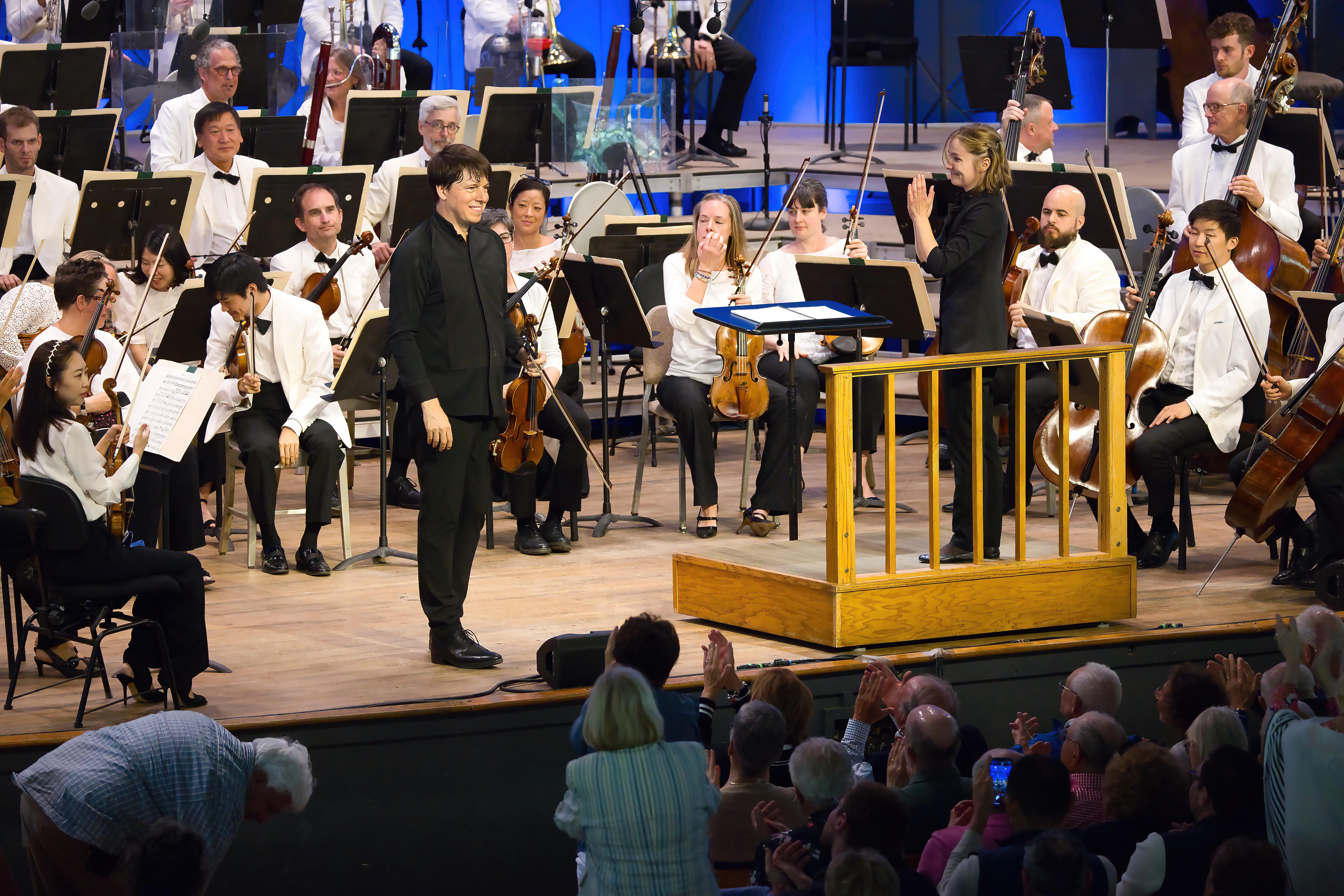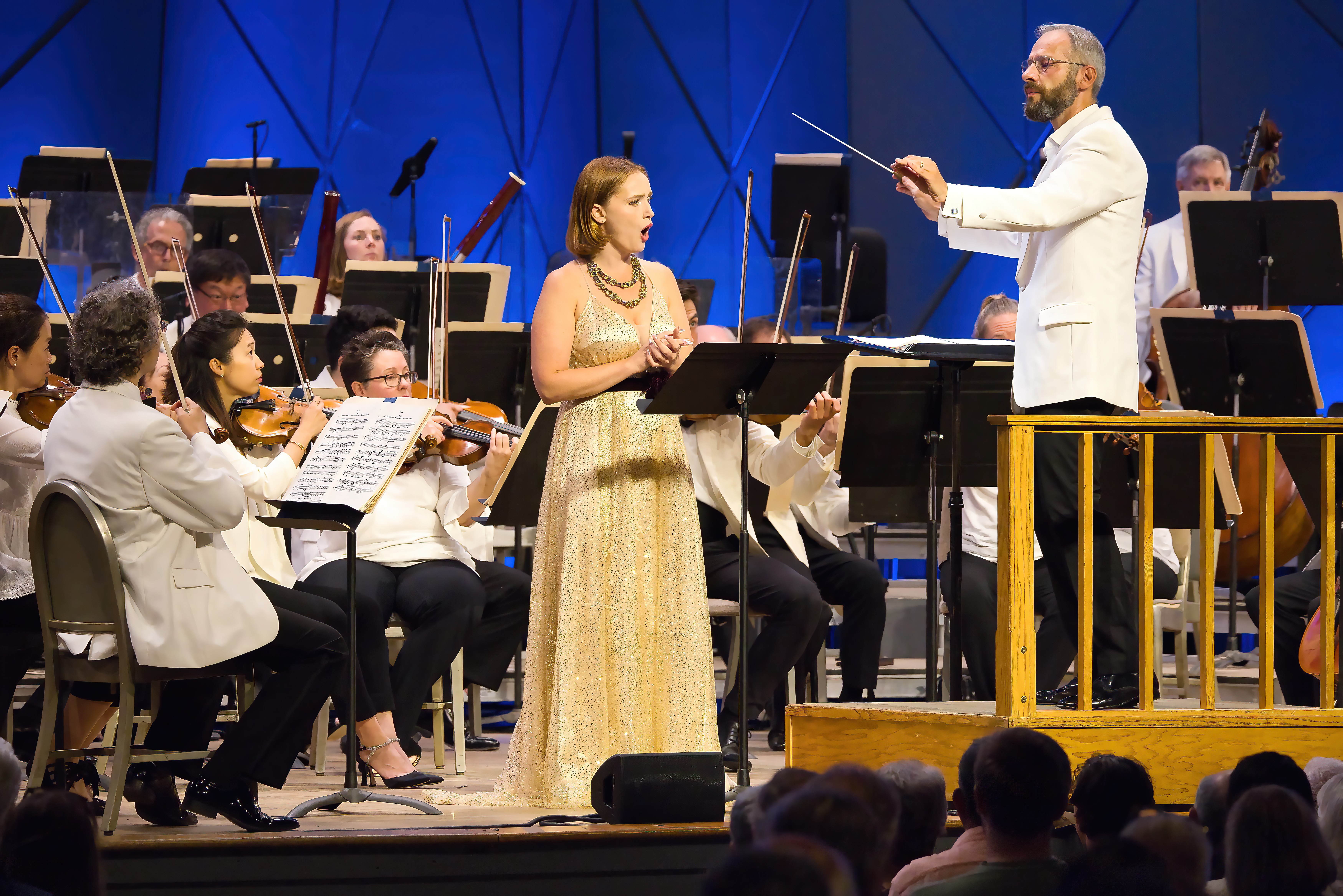One of the focuses of this year’s Proms, concentrated during the month of August, was the centennial of György Ligeti. The first of these, presented on August 11 by The London Philharmonic Orchestra, along with the London Philharmonic Choir, the Royal Northern College of Music Chamber Choir, and the Edvard Grieg Kor, conducted by Edward Gardner, started in what might be the most obvious place, especially for drawing a large audience, focusing on the music used in Stanley Kurbrick’s 2001: A Space Odyssey. The movie certainly introduced Liget’s music to a larger audience than it had ever received before that time, and made him a sort of star, both of in new music circles and in the world at large. This concert included Ligeti’s Requiem and Lux Aeterna, and ended, inevitably, with Also sprach Zarathrustra by Richard Strauss. Robert Stein’s program note asserted that Ligeti’s Requiem, composed from 1963 to 1965, was an unexpected next piece to follow his Poèm symphonique, for 100 metronomes, of 1962, but in fact the micropolyphony of the choral and orchestra work is a pretty exact recreation of the texture produced by many metronomes clicking away simultaneously. In the Requiem, Ligeti aligns that micropolyphonic texture with a quite remarkable and highly personal sense of register and orchestral color, producing a new and striking musical character at just about every moment. The Lux Aeterna, for 16-part unaccompanied chorus, written in 1966, which was performed by the Edvard Grieg Kor, is more concentrated and refined, and even more striking, being a distillation and, if you like, condensation of the Requiem for sixteen unaccompanied voices. All of the performances were beyond reproach.
The Prom on August 15, presented by the Royal Philharmonic, conducted by Vasily Petrenko, started with Lotano by Ligeti. Written in 1967, Lotano is in the vein of the Requiem and Lux Aeterna, but concentrates on luminous orchestration. Lontano was followed by the Beethoven Fourth Piano Concerto, with Alexandre Kantorow, as soloist, in what seemed to me to be the best performance of anything I’d ever heard, Kantorow, as an encore, delivered a radiant performance of somebody’s arrangement of the Finale from The Firebird. The concert ended with the Shostakovich Tenth Symphony, written in 1953. Shostakovich had suffered serious humiliation and oppression during the later 1940s and early 1950, a certain amount of it aimed directly at him by Stalin. During that time he wrote a number of pieces which he simply didn’t release, realizing that they would cause him even more trouble. Stalin’s death in March of 1953 was a source of relief for the composer, and the Symphony seems to be a powerful expression both of that relief and its attendant relative freedom, as well as a reflection on aspects of the situation. The second movement, which is a relentless and caustic scherzo is said to be a portrait of Stalin. The performance of the piece was vivid and powerful. The whole concert was unforgettable.
The Prom on the evening of August 13 was presented by The Budapest Festival Orchestra, conducted by Iván Fischer, on the heels of their Audience Choice Proms that afternoon, in which the audience chose the program by vote as it went along, working from a menu provided to them. The evening began with Mysteries of the Macabre by Ligeti, an excerpt from his opera Le Grand Macabre, consisting of an aria for the Chief of the Secret Political Police, arranged by Elgar Howarth. The soloist for this was Anna-Lena Elbert, who, as was appropriate to the music it dramatic situation in the opera, was all over the stage, in a manner just as frenetic as the music she was singing. She was singing in German, but the text came think and fast and relentlessly, so one wasn’t able to actually get any words at all, which didn’t in any way detract from the absurd and funny effect of the piece. This was followed by Béla Bartok’s Third Piano Concerto, with Sir András Schiff as soloist. It received a lovely and heartfelt performance, as was appropriate to the valedictory nature of the piece. The concert concluded with the Beethoven Third Symphony. The playing all the way through the concert was as good as one could have ever expected.
The impression that Ligeti was presented only as the composer of his modernist, micropolyphonic, Space Odyssey music was rectified by the Prom on August 20, presented by Les Sièles and its conductor François-Xavier Roth. This concert included the Concert Românesc, representing the highly polished Bartokian music, infused with folk-like material, that Ligeti wrote before he fled Hungary for the west in 1956 and the Violin Concerto of 1989-93, with soloist Isabelle Faust, which gave full evidence of the highly multifaceted, multisourced and, at least for this listener, more fully satisfying music that he was writing toward the end of his life. The character of the two works and the progress and shape of each, are not dissimilar, even though the later piece is freer in its incorporation of different tunings and more ‘exotic’ instruments, such as ocarina and swanee whistles. It conveys the sense of Ligeti as a continually inquiring and endlessly curious musical personality. Les Siècles specializes in playing instruments and tunings appropriate to the particular repertory they are performing, so the Ligeti pieces on the first half of the concert were performed on modern instruments tuned to A=442Hz; the Mozart works on the second half of the concert, the 23rd Piano Concerto, with soloist Aleander Melnikov, and the 41st Symphony, were performed on Classical-period instruments tuned to A=430Hz.
All of these concerts can be heard on the BBC Sounds website.
Every Living Creature
Choral music by Kenneth Leighton
Rebecca Lea, Nina Bennet, soprano; Ciara Hendrick, mezzo-soprano;
Nick Pritchard, tenor
Finchley Children’s Music Group, Grace Rossiter, music director
Londinium, Andrew Griffiths, director
SOMM Records
Kenneth Leighton (1929-88) was a distinguished composer and academic. He taught at various places, including Oxford where he had studied as an undergraduate, spending the bulk of his academic career at the University of Edinburgh. He wrote in many genres, but it is his music for choirs that is most prized. His choral music is rigorous in construction with vibrant rhythms and skilful formal designs; tonal, but never overly sentimental. Every Living Creature, performed by Londinium, the Finchley Children’s Music Group, and a quartet of vocal soloists, conducted by Andrew Griffiths, is one of the finest recordings I have yet heard on the SOMM imprint, with a lively reverberant acoustic and wide dynamic range. It also contains a number of first recordings. Prior to the recording, some of the scores were not even published, languishing in library collections.
The centerpiece of the recording, Laudes Animantium, Op. 61 (1971), is a celebration of animals, with a variety of poets’ observations of creatures real and fanciful. Leighton himself was an animal lover, with a cat, rabbit, and dog who he often watched playing with his children in the yard. His faithful labrador retriever would sit at his feet while he composed, only stirring when Leighton played a chord or two that displeased him.
The piece’s Prelude is from Song for Myself by Walt Whitman, the author describing animals as peaceful, ideal companions. Tenor Nick Pritchard, who gives several standout performances on the recording, sings the Whitman poem with a sweet-toned lyrical voice and excellent diction. Rebecca Lea sings with purity and beauty, animating the subjects of many of the movements. Soloists from the choir, Arielle Lowinger and Madeleine Napier, deserve plaudits as well for their singing, performing with fetching delicacy in “The Lamb.”
The mood of the cycle shifts between movements, with a lively scherzo, “Calico Pie,” a dramatically imposing “The Tyger,” and a truly terrifying depiction of “The Kraken.” Throughout, the choir is expressive and finely honed in its accuracy. Griffiths’s direction keeps the counterpoint clean and the tempos fluid. The end of the cycle, “Every Living Creature,” is impressive, with soloists and choristers joining in a piece that could well be an excerpted anthem to conclude a celebration of animals in any Episcopal church with the performing forces to attempt it. Griffiths and company have set a high bar.
“An Evening Hymn” and “Lord, When the Sense of Thy Sweet Grace” also feature Lea as soloist, her tone and dynamic control impeccable. Hushed singing begins the Evensong anthem, gradually growing, with free counterpoint juxtaposed against lush verticals.
“London Town” is a powerful piece, with the choir opening up to clarion fortissimos in its climaxes. “Three Carols” are quite lovely and would enhance many a Christmas Eve service. “Nativitie” features homophonic polychords alternating with tight canons. As the piece progresses, the lines get longer and are buoyed by chords, ending with a well executed pianissimo cadence. The final piece on the recording is “The Hymn to the Trinity,” which explores Lydian melodies and staggered cadences, a repeating homophonic passage tying things together. The latter half features brisk overlapping melodies. The Lydian returns, followed by a bright amen cadence, It is a moving close to a disc of great discoveries. Someone please publish this music and distribute it widely.
-Christian Carey
The late night Prom on August 9, was billed as Mindful Mix Prom. It was presented by Ola Gjello, along with Ruby Aspinall, the Carducci String Quartet, and VOCES8. It was a little difficult initially for one to know exactly what one was in store for. The advanced material invited one to “relax into a late night musical meditation” which would explore “the universal, timeless themes of night, stillness and prayer through the lens of composers old and new,” with a playlist that “drifts from Renaissance to Radiohead.” In a Proms program for an earlier concert, Tom Service’s “The Proms Listening Service” had promised “carefully curated music designed to put us in a hypnotic nocturnal reverie.” Among the composers listed in this Prom’s program, aside from Gjello, were Caroline Shaw, Philip Glass, Roxanna Panufnik (with a work commissioned by the BBC for this concert), Ken Burton, Jake Runestad, Eric Whitacre, and Samuel Barber–also William Byrd. The program advised that the listed order was subject to change and that there would be improvisations by Gjello interspersed among the other works. Since the approximately hour and fifteen minutes duration of Prom was filled with continuous music and the program said that the order listed was not necessarily the order in which works would be performed, it was difficult to tell exactly what one was hearing at any one point of the performance. There were hints, of course: For instance Caroline Shaw’s piece and the swallows was presented with “a new violin solo by Christopher Moore.” So when there was a violinist standing in the midst of the singers, one could have probably safely assume that one was hearing the Shaw (the program did not list the names of the members of the Carducci Quartet, so one might have assumed that Chistopher Moore was the person playing–in fact it was Matthew Denton, the quartet’s first violinist–that information the product of later research). The harpist, Ruby Aspinall, played only in one piece near the end; that might have been the Panufnik’s Floral Tribute, setting a poem by Poet Laureate Simon Armitage in tribute to Queen Elizabeth II (just guessing, since maybe the fact that it was the commissioned piece would justify bringing in one player for only that piece). It was clear that the end of the program was the Barber, the choral version of Adagio for Strings as an Agnus Dei, which was played by the Carduccis and sung by VOCES8. There was also, over the whole length of the performance, a rather elaborate light show, which this listener did not find soothing, since it made the program hard to read and made it even more difficult to figure out where one might have been in the program. The answer provided by the evidence of the concert to the question “what is mindful mix” though was, apparently, “easy listening.”
Despite complaints, it was clear immediately and through the duration that the playing and singing was really first class and really beautiful and one could be very mindful of and thankful for that.
The Prom on August 8 was presented by the BBC National Orchestra of Wales and the London Symphony Chorus upper voices, conducted by Jaime Martin. The major work on the first half of the concert was the Violin Concerto by Grace Williams, with soloist Geneva Lewis, which was receiving its first Proms performance. The work is in three movements and last about half an hour. It is filled with rhapsodic music which features very clear and compelling long lines. Its orchestration is clear and rich and varied, and the writing for the soloist is very effective. Its tempo and texture over the three movements, though, is very unvaried, so that, in the end, there’s very little differentiation at all, and this listener, anyway, was unable to remember any point in the piece more than any other point, or follow any sort of argument, despite the beauty and effectiveness of any one of the moments. It was preceded in the concert by an Overture, written in 1919 by Dora Pejačević, a composer I’d never heard of before, who is being featured on this year’s Proms, in observance of the centennial of her death. A member of the Hungarian and Croatian aristocracy, Pejačević, according to the program “resolutely rejected an easy path for herself” and pursed a career as a composer (she is said to be the first Croatian composer to write a piano concerto). The overture is lively and appealing and makes one eager to hear more or her music. The language and orchestration are not too far away from that of Holst’s The Planets, written two years earlier, which was the second half of the concert. The audience, which packed out the house, was clearly there for the Holst, and they applauded and cheered loudly and lustily and long after every movement. There was some good reason for this, as the performance was tremendous, as were the performance of the other two pieces.
These Proms and all the others can be heard at https://www.bbc.co.uk/sounds/series/m001nh6k
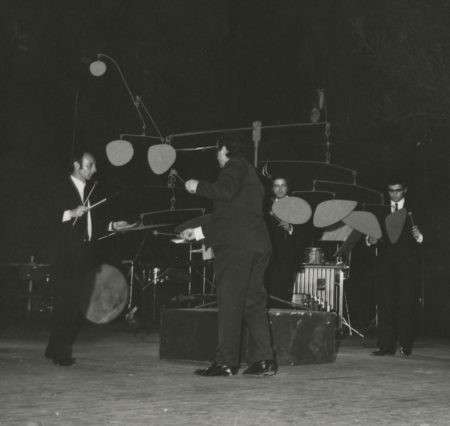
I don’t know when else you’d have a chance to see expert musicians interact with a sculpture by one of the most iconic American artists of the 20th century. This rare event, on August 20 at the Dimenna Center in New York, is part of the annual TIME:SPANS festival.
In Earle Brown’s Calder Piece the artist’s mobile is an essential part of the piece. The artwork will “conduct” the Talujon Percussion Quartet as its sections sway from their pivot points. And, yes, you will also get to see the instrumentalists “play” the sculpture, though the artist himself initially expected a more forceful display. “I thought that you were going to hit it much harder—with hammers,” said Calder after the first performance in the early 1960s.
Calder Piece is “the focal point and central hinge of this year’s festival,” according to the introduction in the festival booklet by Thomas Fichter and Marybeth Sollins, executive director and trustee respectively of The Earle Brown Music Foundation Charitable Trust which produces and presents TIME:SPANS. But it is by no means the only highlight of the dozen concerts in the festival.
Talea Ensemble, JACK Quartet, International Contemporary Ensemble, Argento…..once again, since 2015, some of the most acclaimed contemporary music ensembles in the country descend on the Dimenna Center for this late summer aural spectacle. Performances are nearly every night August 12 – 26, chock full of 21st century concert music in a myriad of styles.
It seems almost impossible to pick out highlights from the dozen performances – there are so many intriguing programs. In addition to the Calder event, here are a few that I am particularly looking forward to:
JACK Quartet playing Helmut Lachenmann (August 13) – my mind was blown the first time I heard Lachenmann’s music performed live. He calls his compositions musique concrète instrumentale, creating other-worldly sounds through extended techniques.
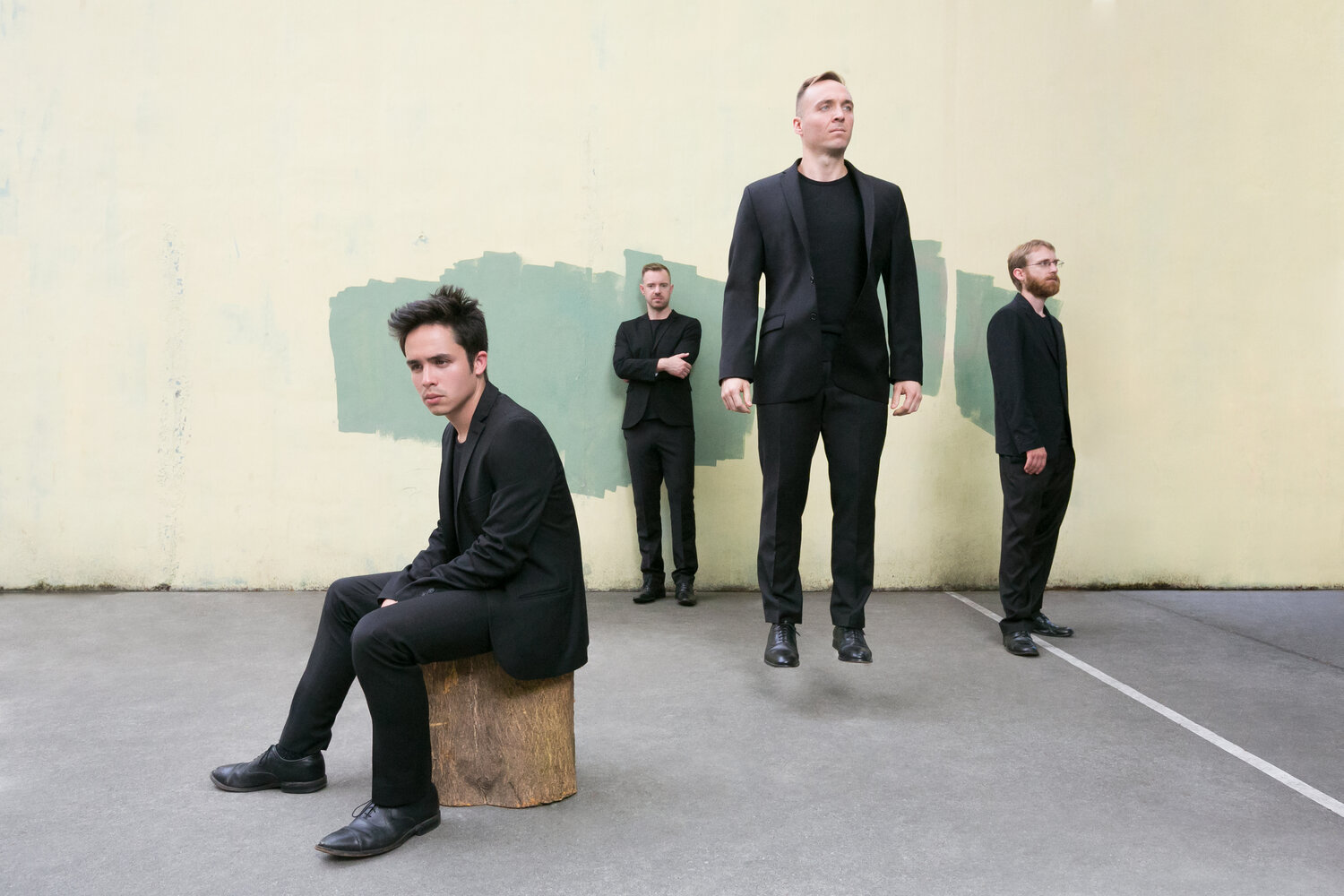
Ekmeles performing Taylor Brook, Hannah Kendall and Christopher Trapani (August 22) – though vocal music isn’t my first choice genre, I am drawn to a cappella ensembles, especially when they are as high quality as Ekmeles. Trapani’s music is always a treat to hear, and his End Words lives alongside music by the equally deserving Kendall and Brook.
Ensemble Signal’s program on August 15 is brought to you by the letter “A”: music by Anahita Abbasi, Augusta Read Thomas. Aida Shirazi, Agata Zubel. I’ve been following Abbasi ever since she won an ASCAP composer award about eight years ago. Her music, though not always easy to listen to, is intense and visceral. I predict it will be a great contrast to Read Thomas’s more tuneful style.
Information and tickets at https://timespans.org/program/
Festival of Contemporary Music
Chamber Music
Sunday, July 30, 2023
LENOX – There were a number of firsts on the July 30th chamber music concert. I have never seen the stage at Ozawa Hall require several minutes of vacuuming up bits of wood, but Malin Bång’s Arching, for amplified cello, amplified tools, and electronics, created considerable, if entertaining, mayhem. Another first: hearing “The Wheels on the Bus Go Round and Round,” paired in fugal counterpoint with the Brahms lullaby.
The find for me at FCM was Tebogo Monnakgotla, a Swedish composer who curated Sunday’s concert. The aforementioned nursery rhythm fugue was from her considerably charming piece, Toys, or the Wonderful World of Clara (2008). The backstory: when Monnakgotla’s child was a toddler, she received all manner of musical toys, and loved to run them all at once. The composer recounted that multiple Brahms-singing toys were terribly out of tune, with themselves and each other (this too was incorporated in the piece, in clusters that distressed the lullaby). The idea may have been whimsical, but its deployment was anything but, the piece creating fascinating swaths of texture and crafty quodlibets.
Toys is memorable, but by no means representative of the rest of Monnakgotla’s programmed pieces. Her early Five Pieces for String Trio juxtaposes open cello strings with glissandos, harmonics, and wisps of sul ponticello. The movements cohere into a well-crafted organic whole. Le dormeur du val, a setting of Rimbaud for soprano and mixed chamber ensemble, has a haunting presence. The poem depicts a soldier who appears to be resting near the field of battle. It is only at its very conclusion that we learn of his wounds and realize that he is not resting, but deceased. Monnakgotla employs trumpet calls and vigorous drums to create a bellicose background. The vocal part contrasts this with a feeling of doleful detachment. Soprano Juliet Schlefer did a fine job presenting the ending’s swerve without overselling, and she was equally sensitive when interpreting with the rest of the poem. Schlefer has a lyric voice of considerable beauty: I would love to hear her again.
Two other composers were programmed on the concert. Bent Sørensen’s compact string quartet, The Lady of Lalott, reveled in banshee-like distant howls and prevalent extended techniques. South African composer Andile Khumalo’s solo piano piece Schau-fe[r]n-ster II combines spectralist inflections, with shimmering overtones and chords spaced according to registral positioning in the harmonic series, with second modernist hyper-virtuosity. Joseph Vasconi played the work with adroit facility and a depth of understanding that belied his student status at Tanglewood. Khumalo’s language is distinctive. One presumes and welcomes that we will hear much more from him.
After every one of her pieces, Monnakgotla took to the stage to warmly greet and thank the performers. It was clear that this affection was returned, and that mutual artistic respect played a role in the concert’s success. Tanglewood students at FCM benefit much from the mentorship of senior composers, and it was clear that this collaboration was quite successful.
The concert ended with a reflective piece by Monnakgotla, Companions (seasons) (2021), for solo violin. It represents the various stages of a professional string player’s career as seasons: The ebullient spring of a young student, the prodigy’s successes during a long, hot summer, artistic maturity and the demands of performing and teaching in autumn, and, finally, the winter of retirement, in which the violinist’s instrument is like an old friend. The music is ambitious yet touching, and was played with assuredness and grace by Connor Chaikowsky. A stirring valediction to a memorable concert.
____
On Friday, August 28th, FCM devoted a curated concert to Anna Thorvaldsdottir, an Icelandic composer who is regularly commissioned by some of the best orchestras in the world. The highlights of the concert were two ensemble works, Hrim and Aquilibria, coached and conducted by Stephen Drury, and the closer, the ensemble work Ró, conducted by Agata Zając. Thorvaldsdottir’s music blooms with effervescent overtones, and addresses elements of tonality in novel and frequently surprising ways.
-Christian Carey
Boston Symphony Orchestra, Anna Rakitina, conductor
Joshua Bell, violin
Eliza Bagg, Martha Cluver, and Sonja Dutoit Tengblad, vocalists
July 30, 2023
LENOX – The Boston Symphony’s offerings on the weekend of the annual Festival of Contemporary Music dovetailed with its curation, lifting up female composers and, on Sunday, a conductor. Leading the orchestra on Saturday, July 30th was Anna Rakitina, who has served as the ensemble’s Assistant Conductor until this Summer. She is a rising star and led the orchestra with assuredness, providing detailed interpretations of all of the scores on the program. The orchestra, for their part, were responsive to her gestures, clearly enjoying working with Rakitina and the music on offer. There was a poignancy to the event, as it was the conductor’s last performance with the BSO as Assistant Conductor.
Ellen Reid’s When The World as You’ve Known it Doesn’t Exist (2019) opened the concert. Commissioned by the New York Philharmonic as part of their Project 19 initiative, a series commissioning female composers to celebrate the centenary of the Nineteenth Constitutional Amendment, affording women the right to vote. The piece is diverse in terms of its musical language, and Reid does an admirable job bringing together the disparate strands of its formal design. Vocalists Eliza Bagg, Martha Cluver, and Sonja Dutoit Tengblad are go-to performers for new music with superb voices and vivid musicality. When the World … required them to sing untexted sounds, some playful, others earnestly dramatic. The orchestra frequently responded to the motives in the voices, creating a back and forth dialogue that contextualized the singers’ presence as part of the proceedings. Given the weight of some of the textures over which the singers were required to perform, a bit of amplification would be understandable: the amount used was excessive, adding periodic harshness that the vocalists neither needed nor deserved.
The outer sections of the piece explored fluid textures, with frequent glissandos and vocal ululations, juxtaposed with orchestral tutti. The middle section, a jazzy surprise, introduced a dyadic motive that was then put through a setof variations, including an extraordinary series of long trills near its end. The motive then joined the beginning material to cohere into a beguiling conclusion. Reid is an imaginative composer and excellent orchestrator. One hopes the BSO will commission and program more of her work.
The last time that the BSO played Nicoló Paganini’s Violin Concerto No. 1 at the Shed was in 1987, with Midori as soloist. To have to wait a generation to hear them play it again seems a crime, as it is one of most ebullient and virtuosic of nineteenth century concertos. There was significant recompense, however, in the pairing of violinist Joshua Bell with the orchestra. Bell is one of the most acclaimed soloists active today, erudite and thoughtful as well as bestowed with superlative technical gifts. Bell composed his own cadenzas for the concerto, which were idiomatic, exploratory, and incredibly challenging.
The piece is front-loaded, with the first movement lasting twenty and some minutes. Such was the inspired nature of its performance alone, that there was a vigorous standing ovation before the second movement even began. When it did, Bell played the ardent Adagio’s central melody with poise and gravitas. The final movement is a rondo, with a sprightly theme treated to a technical tour de force of variations. Once again, Bell performed his own cadenzas, which were formidable yet delivered with elan. Once again at its conclusion, the audience greeted Bell and the BSO with a standing ovation. There was no encore: how can you top Paganini?
The second half of the concert was devoted to ten selections from Sergei Prokofiev’s Music from the Ballet Romeo and Juliet, Op. 64. The piece contains some of Prokofiev’s most memorable melodies, its rich orchestration tailor-made for the BSO. Rakitina never allowed the music to be overdone, yet brought out the emotive side of Romeo and Juliet. In its Introduction, she urged the strings to swoon, yet made ample room for woodwind and horn solos. “Montagues and Capulets,” perhaps the hit tune of the work, was given a brisk reading that embodied the crackling intensity of the families’ rivalry. Contrastingly, “The Child Juliet” was rendered with an innocent delicacy that was quite touching. Likewise, a yearning quality imbued the “Balcony Scene” with luminous ardor. “The Death of Tybalt,” in a flurry of activity, was jaunty in its opening and bellicose at its conclusion, percussion and brass providing a roaring climax. The orchestra sounded tremendous here.
“The Death of Juliet” concluded the performance with one of the ballet’s most arresting themes, played caressingly by the violins and buoyed by lower strings, with eloquent utterances from the lower brass and a rejoinder by a chorus of woodwinds. Its stark close, all octaves with sepulchral bass, had more pathos than a minor chord could ever supply. From beginning to end, this was an engaging program.
-Christian Carey
Boston Symphony Orchestra, Dima Slobodeniouk, conductor
Avery Amereau, mezzo-soprano
July 29, 2023
LENOX – This year’s Festival of Contemporary Music at Tanglewood spotlighted female composers. Four created self-curated concerts, and others were featured on BSO concerts. Agata Zubel’s In the Shade of an Unshed Tear, originally composed for the Seattle Symphony, was on the program Saturday night in the Shed. Before its performance, conductor Dima Slobodeniouk talked briefly with Zubel onstage. Prominent among their remarks were the stipulations of the original commission. Seattle was pairing Zubel’s piece with works by Beethoven and wanted her to compose for a classical-sized ensemble, with only timpani for percussion. Slobodeniouk pointed out that new pieces in Europe are generally for a much larger orchestra. Zubel acknowledged that the commission was a challenge.
With In the Shade of an Unshed Tear, the composer rose to the challenge. The timpani began the piece with thunderous attacks, the orchestra following in kind, creating a fortissimo sound that tested the boundaries of a classical-sized ensemble. Zubel employed glissandos grouped among the strings at a lower dynamic level. Still, the fortissimo material seemed inevitable to win out. In a swerve, a denouement followed by the timpani playing pianissimo proved an interesting and organic ending.
Olivier Messiaen’s Les Offrandes oubliêes is a relatively early piece. It is surprising how much of the composer’s musical language was in place by the time he was in his twenties. An ascending mixed-interval scale serves as the principal theme. At the time, the composer was studying Rite of Spring and this is reflected in more rigorous passages that contrast the beguiling melodic ascent.
Mezzo-soprano Isabel Leonard was indisposed and Avery Amereau substituted for her as the soloist in Hector Berlioz’s Les nuits d’été. With a beautiful, round tone throughout all registers from chest voice to high notes, Amereau’s voice was well-suited to the considerable demands of Berlioz’s half-hour long song cycle. Slobodeniouk and she had a few mild coordination challenges, but these were well worth the flexibility of their interpretation.
Maurice Ravel’s Daphnis et Chloé, Suite No. 2 is one of the composer’s finest orchestra pieces. Orchestrated with a deft hand for colorful, abundant contrasts, it encompasses sequences of delicate impressionist harmonies and neoclassical dancing rhythms, with powerful swells at climatic moments that bring the whole orchestra to bear. Slobodeniouk conducted the BSO with verve, urging them to make the most of tutti crescendos while also making ample room for solo passages. The orchestra played with precision throughout and abandon whenever appropriate. It was a satisfying, frequently inspiring evening.
- Christian Carey
